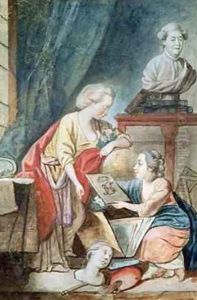Germaine (Madame de Stael) Necker Paintings
Germaine Necker, better known as Madame de Staël, was a pivotal figure in European literary and political life during the late 18th and early 19th centuries. Born Anne-Louise Germaine Necker on April 22, 1766, in Paris, France, she was the daughter of Jacques Necker, a prominent Swiss banker and statesman, and Suzanne Curchod, a well-educated Swiss hostess. Her father's role as the finance minister to Louis XVI and her mother's literary salon, frequented by the leading intellectuals of the day, provided Germaine with an exceptional upbringing steeped in the rich intellectual and cultural milieu of the time.
Madame de Staël emerged as a significant literary figure in her own right, renowned for her works on literature, politics, and culture. Her notable contributions to literature include her novels 'Delphine' (1802) and 'Corinne, or Italy' (1807), which explore the themes of women's rights and individual freedom, marking her as a precursor to the feminist movement. Moreover, her critical work 'On Germany' (1810), which introduced German Romanticism to a broader European audience, was viewed as revolutionary. It led to her exile by Napoleon, who saw her political and intellectual influence as a threat to his regime.
Throughout her life, Madame de Staël was a fervent advocate for liberty, equality, and fraternity, ideals that were the bedrock of the French Revolution. Despite her support for these principles, she was critical of the Revolution's excesses and the rise of Napoleon's dictatorship. These political stances forced her into periods of exile, during which she traveled extensively across Europe, influencing and interacting with leading intellectuals and political figures of her time.
Madame de Staël's salon in Coppet, Switzerland, became a haven for intellectuals, writers, and exiles during the Napoleonic era, further cementing her status as a central figure in European intellectual life. Her writings and her active engagement in political and intellectual debates helped shape the contours of Romanticism and contributed significantly to the development of 19th-century thought.
Germaine de Staël died on July 14, 1817, in Paris. Her legacy endures through her contributions to literature, her championing of liberal causes, and her role in fostering the exchange of ideas across Europe. Madame de Staël remains a towering figure in the history of European letters, celebrated for her intellectual independence, her spirited defense of freedom, and her profound impact on the Romantic movement.
